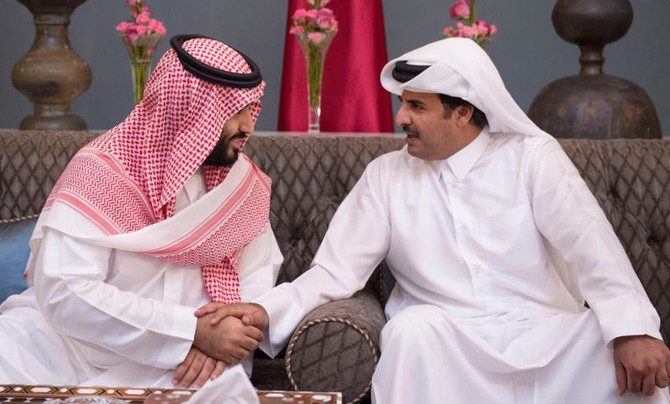Speculation about the phone call between Qatar’s Amir and Saudi Arabia’s Crown Prince grows with some media outlets “jumping to conclusions”
Qatar’s Amir Sheikh Tamim bin Hamad Al Thani held a phone call with Saudi Arabia’s Crown Prince Mohammed bin Salman on Sunday, the first since the two countries restored their diplomatic ties on January 5th.
According to Qatar’s foreign ministry, Sheikh Tamim wished the Saudi crown prince good health and wellness after he reportedly underwent a surgery for appendicitis. The two royals also discussed “the latest regional and international developments”.
Read also: A decade later: Has Al Jazeera changed its tune since the Egyptian uprising?
“The Amir affirmed the State of Qatar’s firm support for the government and people of the Kingdom of Saudi Arabia and everything that would enhance the security, stability and sovereignty of the Kingdom of Saudi Arabia, considering its stability as an integral part of the stability of the State of Qatar and the Gulf Cooperation Council system,” added the statement.
Media speculations
While the phone call was a renewal of the growing Qatari-Saudi ties, it also came days after a US intelligence report found that the Riyadh’s crown prince was involved in the murder of Saudi journalist Jamal Khashoggi in 2018.
Consequently, several media outlets speculated that the phone call represented Qatar’s support to Saudi Arabia’s de facto leader. Among those outlets was the London based Middle East Eye [MEE], which claimed that Qatar had joined its neighbours in showing support for Saudi Arabia in the Khashoggi case.
However, a diplomatic source told Doha News that such speculation was misguided and inaccurate. “The call had nothing to do with the declassification of the US intelligence report or the case of the late Jamal Khashoggi” he added.
Several analysts who have been following developments in the GCC have further corroborated this, among them Dr. Andreas Krieg, a lecturer at King’s College London, who tweeted, “It looks like the MEE piece misconstrued the phone call between Qatar’s Emir and MbS – Qatar’s expression of support for Saudi at that time was not about the Khashoggi report but about the Houthi missiles attacks – Qatar hasn’t come out to defend MbS over the Khashoggi murder.”
On the day of the call, Qatar condemned Houthi missile attacks that targeted the kingdom’s capital Riyadh, denouncing it as “a dangerous act against civilians, which contradicts all international norms and laws”.
While Qatar’s government has not commented on the release of the Khashoggi report, in contrast, the UAE and Bahrain expressed their support for the man believed to be behind the journalists murder, Crown Prince Mohammed Bin Salman, on the same day the classified information was disclosed.
Commenting on the report, Manama expressed its rejection “of anything that would undermine the sovereignty of Saudi Arabia”.
Read also: Iran welcomes Qatar’s call for ‘inclusive’ regional talks
“Bahrain emphasises the importance of the fundamental role of Saudi Arabia under the leadership of King Salman and his crown prince, its policy of moderation regionally, in the Arab region, and internationally, its efforts to enhance regional security and stability, and promote global economic development,” said Bahrain’s state news agency [BNA].
The UAE’s foreign ministry also released a statement in solidarity with one released by Saudi Arabia, which dismissed the US report as “false and unacceptable”.
“The Ministry of Foreign Affairs and International Cooperation expressed its confidence in and support for the Saudi judiciary, as well as Saudi Arabia’s commitment to enforcing the law with transparency and integrity, and holding those responsible to account,” read a statement from the UAE’s foreign ministry.
Unchanged position
“Qatar notably did not emulate the UAE in criticising the Khashoggi report or US intelligence findings,” Samuel Ramani, doctoral candidate the University of Oxford’s Department of Politics and International Relations told Doha News.
“This shows that Qatar sees opportunities in establishing close relations with the Biden administration, which might need Qatar as a bridge between the U.S. and Iran in the future,” he added.
Ramani also believes that Qatar’s silence on the case further exhibits the prominence of its bilateral relations with Turkey and its refusal to be part of what experts described as the “problematic aspects” of Saudi Arabia.
“Qatar has a difficult balancing act ahead, but this statement shows how it can appease Mohammed bin Salman without creating rifts with the Biden administration or Turkey,” he added.
Since the brutal assassination of the Washington Post journalist in the Saudi consulate in Turkey, Qatar, as well as its flagship media network Al Jazeera, has called for accountability into the murder.
Media coverage
Although funded by the state, Al Jazeera remains an independent entity. Since the murder in 2018, it has continued to cover the case on all of its platforms, providing content in both Arabic and English.
The network broke into its regular programming to report on the release of the report on Friday and its coverage remained as critical as it was even before the Al Ula declaration when it aired deep investigative pieces.
This included Al Jazeera Arabic’s “What’s Hidden is More Immense”, which revealed several horrifying details of the murder, including details of the purpose built oven believed to have been used by the Saudi assassination squad to burn some of the remains of Jamal Khashoggi.
Follow Doha News on Twitter, Instagram, Facebook and Youtube







